Introduction
With the evolution of artificial intelligence (AI)- we now have powerful tools that can edit digital images with amazing accuracy. Among these tools are AI-based image generators that can manipulate or “undress” photos, often referred to as DeepNude AI generators. Some may use these for curiosity or technical interest but they also pose ethical, psychological, legal and privacy risks – especially when misused. We must use these tools responsibly to avoid serious consequences.
What is DeepNude AI Generator?
The DeepNude AI Generator is an artificial intelligence tool that can digitally remove clothing from images of people with amazing precision and create synthetic nude photos. These apps use advanced AI technology and image processing such as Generative Adversarial Networks (GANs) to generate hyper-realistic but entirely fake images. While the technology itself is not new, its application raises ethical, legal and privacy concerns.
How Does DeepNude AI Work?
DeepNude AI is a controversial app that uses artificial intelligence to generate non-consensual nude images from photos of clothed people, mostly women. The software uses deep learning techniques, specifically Generative Adversarial Networks (GANs) to analyze the clothing, body shape and pose and facial recognition of a person in a photo. It then predicts and renders a synthetic nude image by simulating skin textures and body details and creates a hyper-realistic output.
Originally released in 2019, DeepNude was taken down due to backlash over its potential for abuse. But clones and open-source nude versions have continued to circulate online, often under different names. These tools have been used to target public figures and private individuals, raising serious ethical and legal concerns. Users can adjust the final output to their liking but ethical considerations must always come first.
The existence and use of DeepNude AI proves we need to consider ethics in AI development and implement safeguards to protect individuals from privacy violations and digital exploitation.
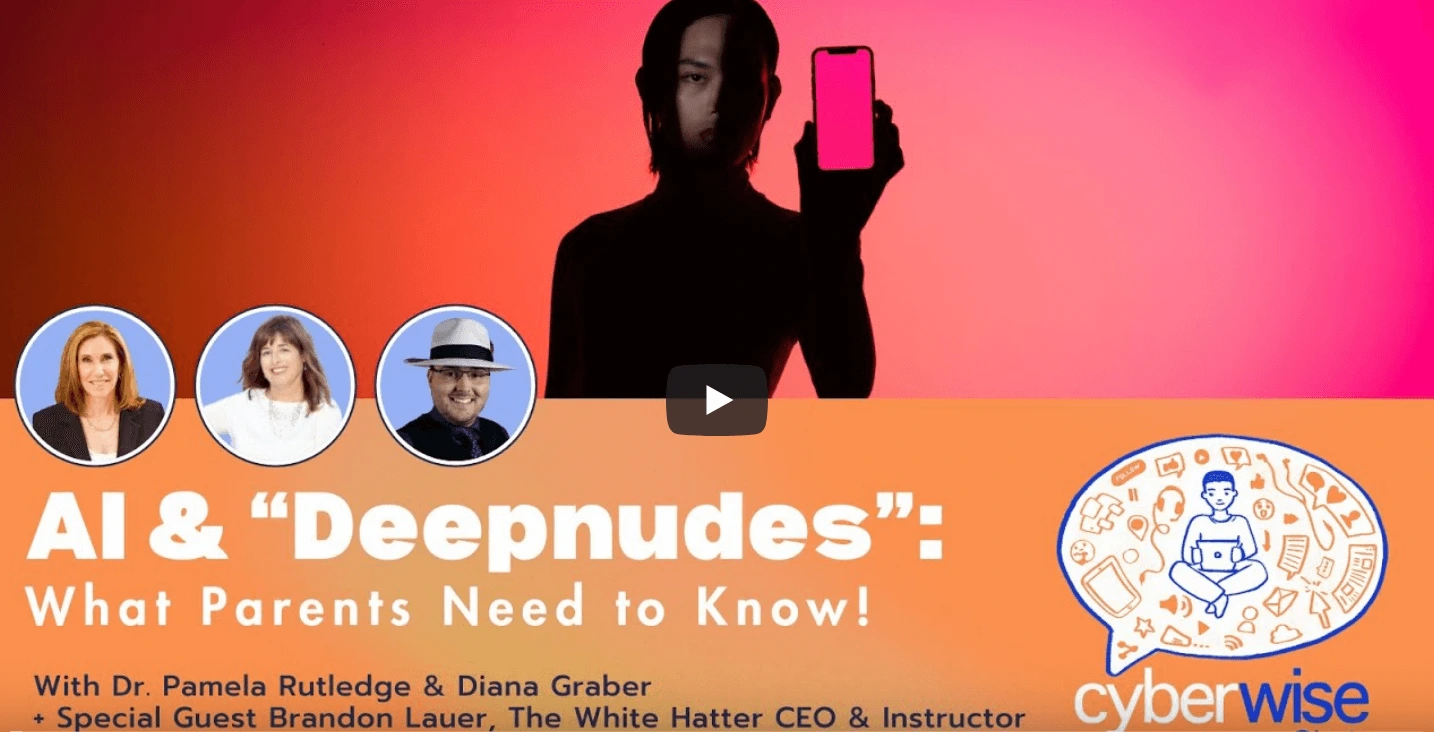
Why DeepNude AI Matters
Imagine finding out that a photo of your child shared innocently on social media has been turned into non consensual content using artificial intelligence. This isn’t science fiction – it’s the reality of tools like DeepNude AI generator, nude AI image generators and deep fake nude AI apps. These technologies use advanced algorithms to edit images, often removing clothing from photos or creating synthetic nude content. While they may seem like a disturbing curiosity, their misuse has raised global concerns about privacy, consent and safety – especially for minors.
You must get consent before using these tools to avoid creating non consensual content.
As a parent or carer you’re aware of the dangers of cyberbullying or inappropriate content online. But AI-powered tools like DeepNude AI or nude AI maker apps add a new layer of risk. They’re accessible, often require little technical skill and can cause irreversible harm. In this guide we’ll explore how these tools work, their ethical and legal pitfalls and what you can do to protect your family and promote responsible technology use.
The Risks of DeepNude AI Tools
Privacy Violations: Your Images Aren’t Safe
Apps like undress nude AI or nude AI generators often require users to upload photos. But where do these images go? Many platforms store data on unsecured servers, leaving personal photos vulnerable to leaks or misuse by third parties, compromising user privacy.
In 2021, AI-powered “nudify” apps like ClothOff made headlines for allowing users to create non-consensual nude images by uploading pictures of clothed people. These apps raised big privacy and ethical questions, especially around kids.
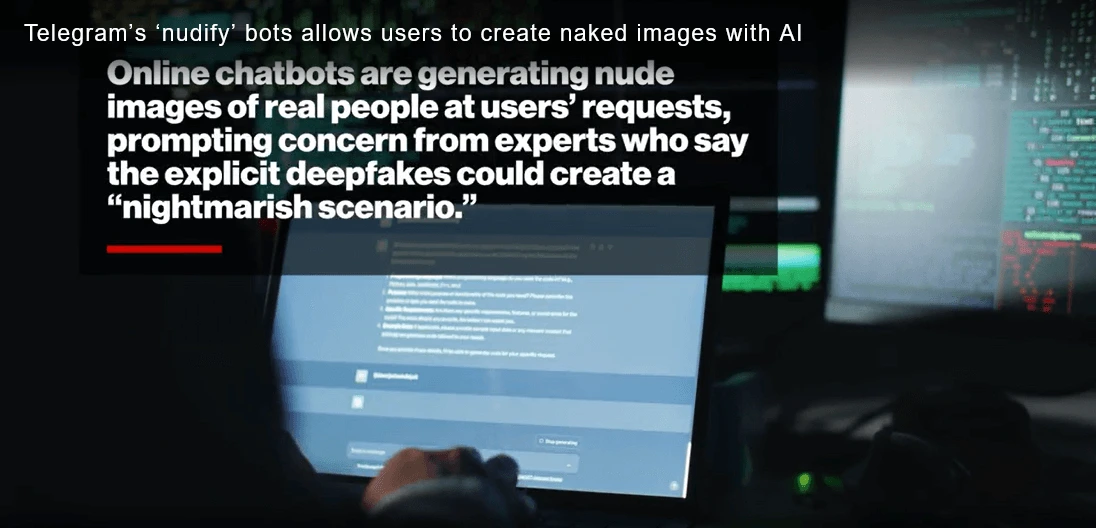
One of the most notable cases was the use of AI tools to create explicit images of schoolgirls in Spain and New Jersey. The images caused severe emotional distress, including panic attacks and bullying for the affected kids. Despite investigations ongoing, the app creators remained anonymous, showing how hard it is to track and prosecute those behind these apps.
And reports say AI tools are being used to “nudify” real kids or put their faces on existing child sexual abuse images. The new images are being used to blackmail kids and force them into more abuse, including live streaming of abuse. Authorities admit current laws are not keeping up with these malicious uses of AI.
Non-Consensual Use: The Line Between Curiosity and Harm
A study by Deeptrace AI found that 96% of deep fake content online is non-consensual pornography and non consensual explicit content, with women and girls disproportionately targeted. Tools like deep fake nude AI allow anyone to create realistic fake nudes using a single social media photo. The psychological impact on victims—shame, anxiety, social isolation—can be devastating. For teenagers, who may experiment with these tools without understanding the consequences, the legal and emotional fallout can follow them for years.
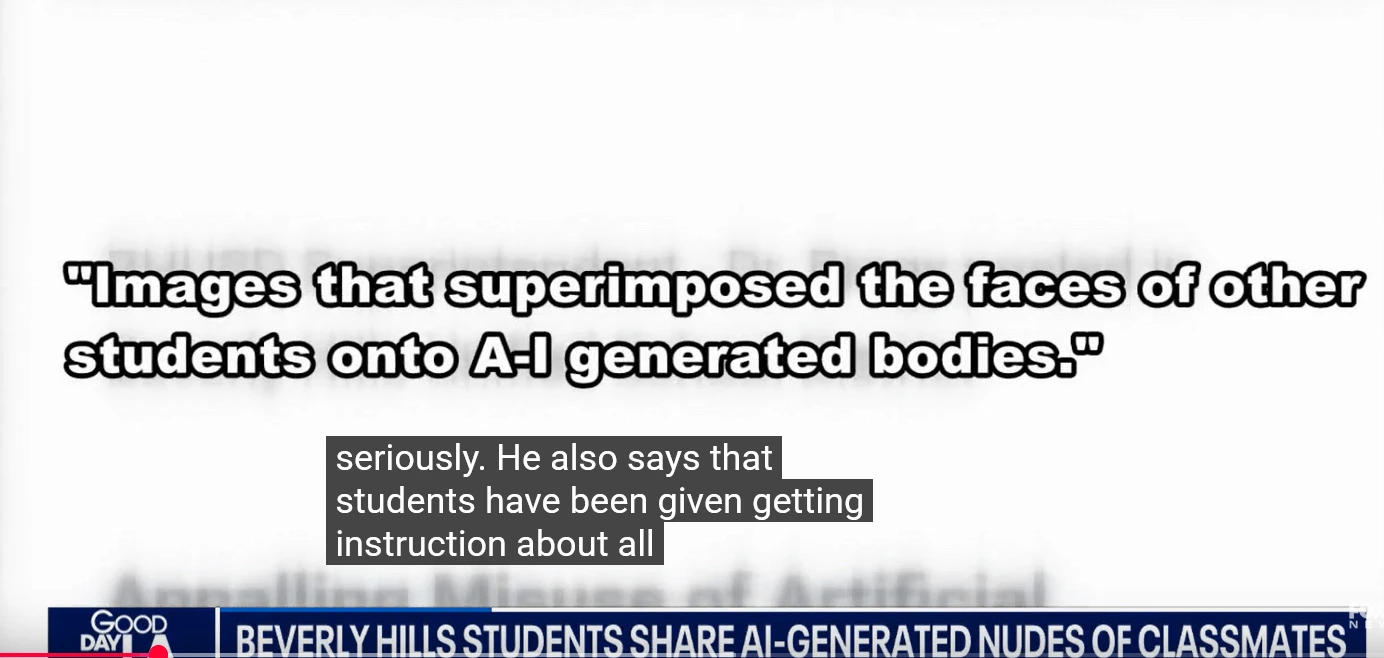
Legal Consequences: It’s Not Just Unethical—It’s Illegal
Many countries including the US and UK have laws against non-consensual pornography. For example the US Cyber Civil Rights Act fines, charges and jails people for distributing intimate images without consent. In February 2024 Beverly Vista Middle School in Beverly Hills, California found 5 students had created and shared AI generated realistic nude images of female classmates. The school district expelled the students and emphasized digital ethics and student safety.
Exposure to Inappropriate Content
Even if your child isn’t using these tools, they might encounter AI-generated explicit content and nsfw content online.
Thorn’s 2024 research indicates that among 1,040 minors aged 9–17 surveyed, 11% reported believing their friends or classmates had used AI tools to generate realistic nude images of other children, with an additional 10% selecting “prefer not to say” . While this highlights a concerning exposure to AI-generated explicit content among minors, it does not confirm that 20% have seen such images of someone they know.
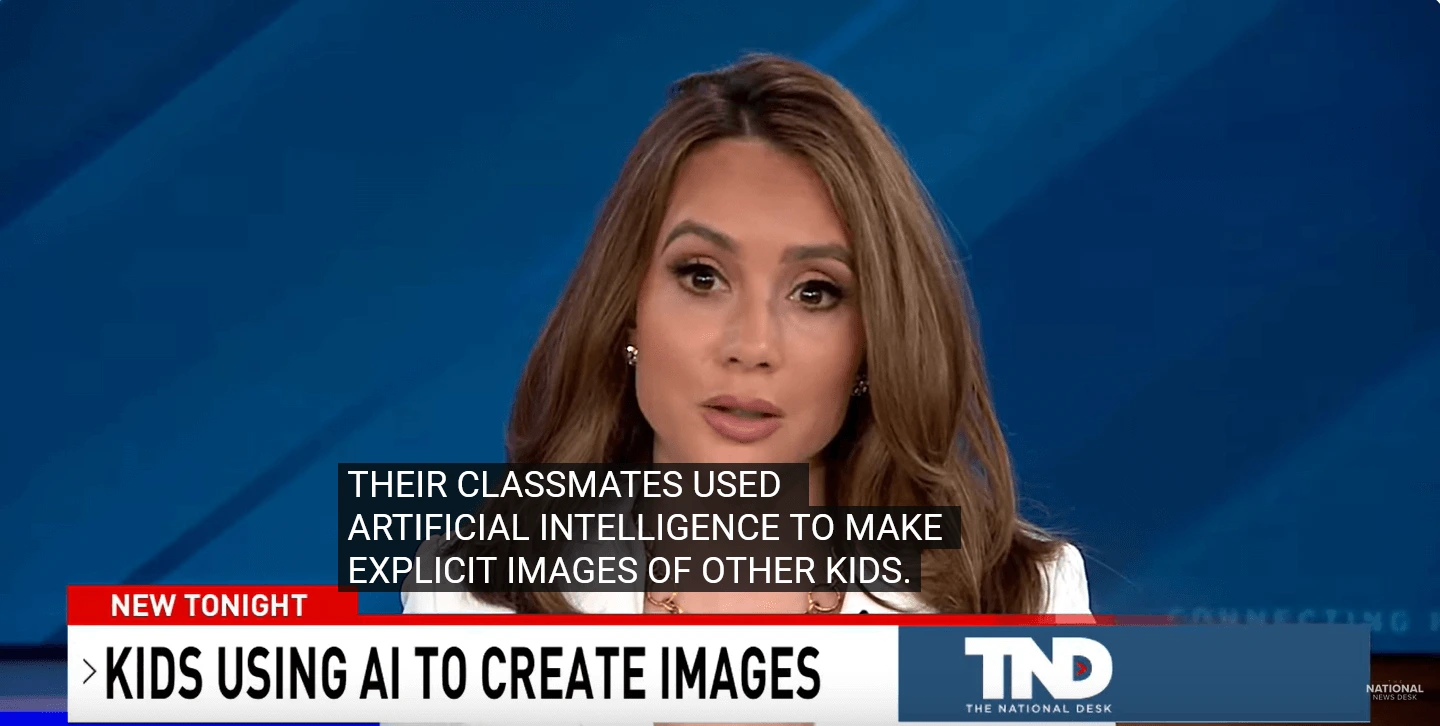
Also a Girlguiding survey found 26% of girls 13-18 had seen sexually explicit deepfakes. This is a huge problem among youth.
Seeing undress AI generated explicit content can have serious psychological impacts on minors including desensitization to consent and normalization of harmful behaviors. Parents, educators and policymakers need to address this through education, awareness and safeguards.
Global Legal Crackdown on AI-Generated Non-Consensual Imagery
Many countries including the US and UK have laws against non-consensual AI generated porn in many jurisdictions.
United States:
There is no federal law called the “Cyber Civil Rights Act” but many states have laws that criminalize the distribution of intimate images without consent. For example California’s Assembly Bill No. 602 allows individuals targeted by sexually explicit Deepfakes made without their consent to sue the creator of the content.
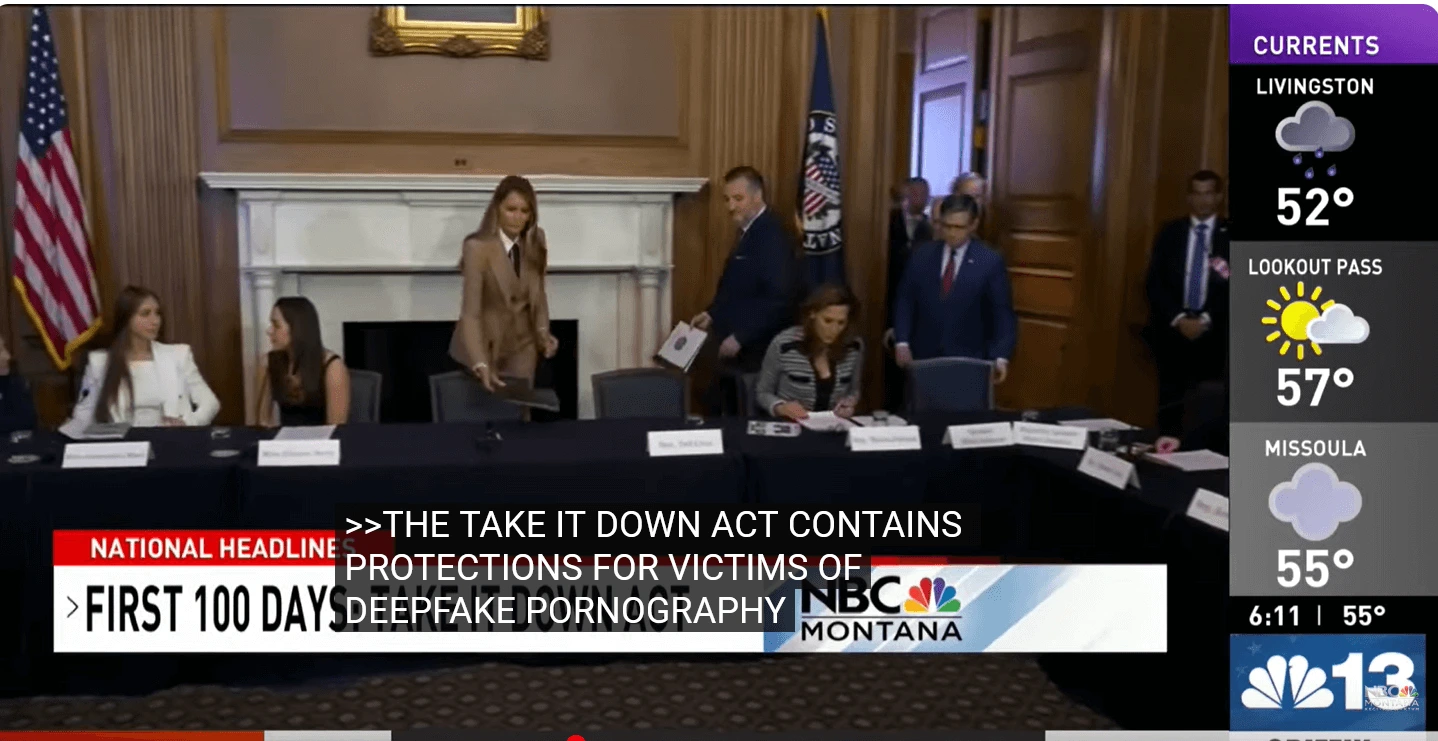
In 2025 the US Congress passed the bipartisan TAKE IT DOWN Act which criminalizes the publication of non-consensual intimate imagery including ai generated deepfakes with up to 2 years in prison. The act also requires online platforms to remove the content within 48 hours of request from the victim.
As for the case of a college student in California charged with a felony in 2022 for using a nude ai image generator to harass classmates, I couldn’t find any publicly available information on this incident.
United Kingdom:
UK has tightened up the laws on non-consensual pornography. Online Safety Act 2023 makes it an offence to share or threaten to share intimate images including deepfakes without consent and up to 2 years in prison.
In April 2025 the Children’s Commissioner for England called for an immediate ban on AI-powered “nudification” apps that create deepfake nude images of children and more legislation.
Parental Liability:
Parental liability for a child’s use of these tools varies by jurisdiction. Generally parents are not criminally liable for their child’s actions unless they were directly involved or negligent. But civil liability may arise if a parent’s negligence contributed to the harm caused by their child’s actions.
Safety Guidelines for Families
For Parents: Proactive Monitoring and Education
Use Parental Controls Strategically: Apps like Bark or Qustodio can block access to websites hosting DeepNude AI generators or undress nude AI tools. Set filters for keywords like “nude AI maker” or “deep fake nude.”
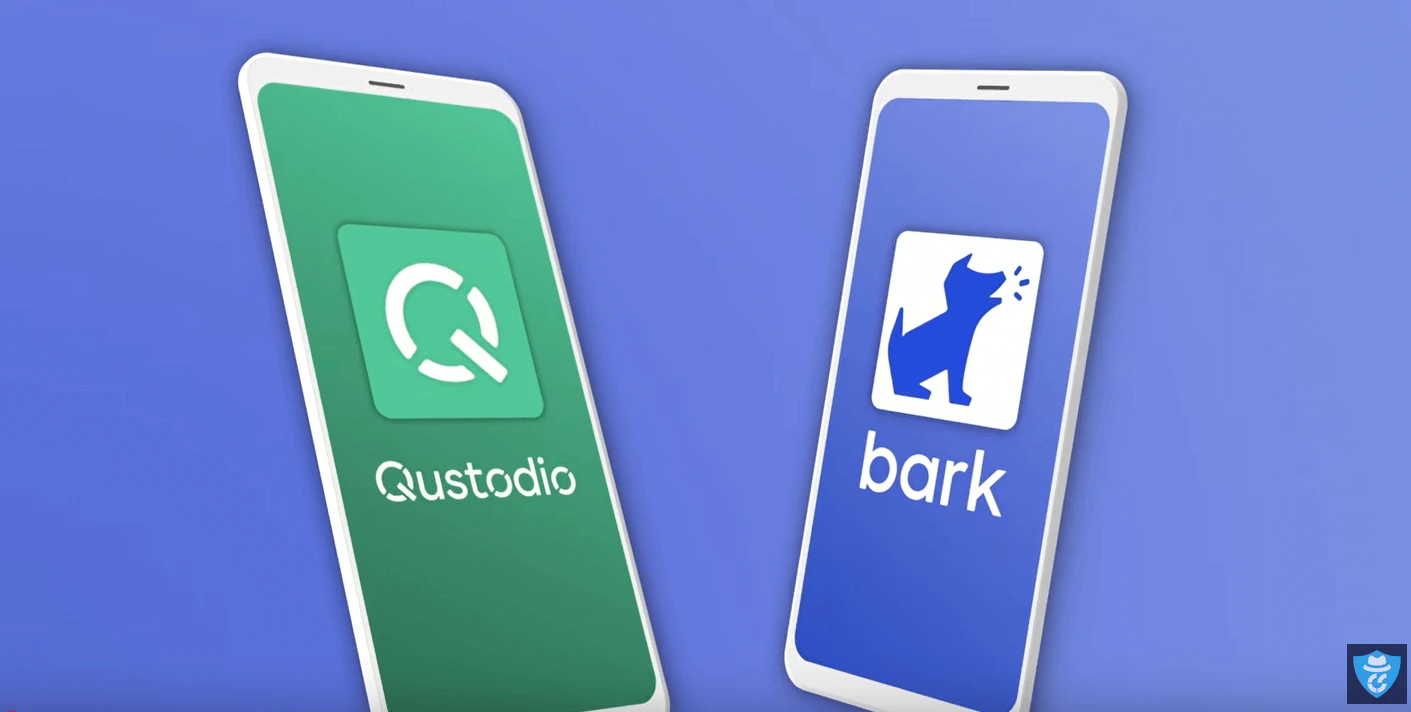
Talk Openly About Consent and Digital Ethics: Frame conversations around empathy: “How would you feel if someone altered your photo without asking?” Prioritize consent in these discussions to emphasize the importance of responsible digital interactions. Use news stories (e.g., celebrity deep fake scandals) to discuss real-world impacts.
Audit Your Family’s Digital Footprint: Limit publicly available photos of your children. Adjust social media privacy settings to “Friends Only,” and avoid posting photos in identifiable locations (e.g., school uniforms).
For Teens: Responsible Use and Critical Thinking
Responsible Use and Critical Thinking: Teach teens the importance of ethical use and responsible behavior when interacting with AI tools. Encourage them to consider the implications of their actions and the potential impact on others.
Avoid Uploading Photos to Unverified Apps: Even “fun” face-swap apps might use photos to train AI models. Teach teens to ask: “Who owns my data?” before clicking “accept.”
Report Suspicious Activity: If a classmate shares AI-generated nudes, encourage your child to alert a trusted adult or use platforms like the National Center for Missing & Exploited Children’s CyberTipline.
For Adults: Ethical Considerations
Ethical Considerations: When using AI tools, it is crucial to ensure ethical practices are followed.
Never Use AI Tools for Non-Consensual Purposes: Even if intended as a prank, altering someone’s image without permission can lead to legal action.
Verify Platform Security: If using AI tools creatively (e.g., for art), choose platforms with clear data policies. Look for phrases like “end-to-end encryption” or “data not stored after processing images.”
How to Talk to Teens About AI and Digital Nudity
1. Normalize Curiosity Without Judgment
Understand that teens may be curious about bodies, sexuality, and emerging AI tools. Normalize curiosity without judgment and encourage them to enjoy exploring these topics. Approach discussions with openness and without judgment to foster trust and encourage honest dialogue.
2. Digital Ethics and Consent
Make sure to highlight privacy, explicit consent and the ethical implications of digital actions. Explain how AI generated explicit images can breach someone’s autonomy and result in serious legal consequences including legal action.
3. Reliable Resources
Introduce teens to safe digital platforms like Common Sense Media, eSafety Commissioner and Internet Matters. Give them a full guide to help them navigate these resources. Tell them to seek help from school counsellors or trusted adults if they get stuck online.
4. Critical Thinking
Get teens to think about their digital actions by asking them questions like, “Would I be okay if this image was of me?” This helps them be empathetic and think about the impact of their online behaviour on themselves and others.
5. AI Companions
Warn about AI companion apps that may engage in inappropriate behaviour or manipulate emotions. Talk about the ethical minefield and remind them to use AI responsibly and the risks of unsupervised use.
6. Create a Safe Space for Mistakes
Let teens know they can approach you without fear if they encounter or make digital mistakes. Establishing a non-punitive environment with cutting edge AI tools encourages them to seek help and learn from their experiences.
7. Advocate for Responsible AI Use
Teach teens that AI is a powerful tool that should be used ethically. Discuss the potential for AI to cause harm when misused and the importance of advocating for responsible AI development and usage, addressing ethical concerns.
Red Flags: When AI Use Becomes Harmful or Addictive
1. Obsessive AI-Generated Explicit Content
Spending too much time creating or seeking out AI-generated nudes, especially without empathy for the people in them, is a sign of desensitization or addiction. Obsessive AI-generated explicit content, including ai porn, can lead to neglect of personal responsibilities and relationships.
2. Secretive Behavior
Changing passwords suddenly, deleting browser history frequently or refusing to use shared devices can be a sign of trying to hide AI-related activities. The user friendly interface of many AI tools makes it easy for individuals to access and use these platforms discreetly. Secrets often go hand in hand with guilt or fear of being found out.
3. Cyberbullying
Using AI to create non-consensual explicit images for the purpose of harassment or humiliation is a big problem. Cyberbullying, including revenge porn, has severe emotional impacts on victims, especially minors. Parents and educators need to be aware that both perpetrators and victims may be in their community.
4. Emotional Withdrawal and Mood Swings
Feeling shame, guilt or fear after interacting with AI generated content, particularly in the adult sphere, which often promises high quality results, can lead to social withdrawal, irritability or depression. These emotional changes can be a sign of inner conflict and psychological distress.
Alternatives to DeepNude AI Generators
- AI for Creativity AI can help with music, design, animation and writing:
Adobe Firefly: This integrates with Creative Cloud, allows you to generate images, videos and vector art with AI-powered features. Real-time collaboration and simplifies complex creative processes using advanced AI technology.
Soundraw: An AI music generator that lets you compose original tracks, balance of AI and human creativity.
- Educational AI Platforms AI can help with learning in many areas:
Duolingo: Duolingo has expanded its language courses with AI, making language learning more accessible and tailored to your progress.
CodeHS: Free courses for middle and high school students to learn AI concepts, ethical understanding and practical skills.
Kialo Edu: A platform that teaches critical thinking through structured debates, get students to think logically and ethically.
- Digital Responsibility Workshops Teaching youth about safe digital behavior is key:
Be Internet Awesome: An initiative by Google that teaches kids the basics of digital citizenship and safety through interactive activities. Be Internet Awesome
Digital4Good: Courses for educators and students on digital safety, wellness and online responsible behavior.
- Family Learning Using AI tools with your family promotes responsible use:
Parental Guidance: Encourage your kids to use AI as a learning tool not a shortcut and teach them to think critically and ethically. Business Insider
Collaborative Exploration: Explore AI tools with your family, set boundaries and discuss the ethics of technology use.
Final Thoughts
The rise of tools like the DeepNude AI generator requires more than just policy—it demands education, ethical awareness, and proactive parenting. Ethical use is crucial to ensure that these tools are employed responsibly and with respect for user privacy. As a society, we must build a culture that prioritizes consent, responsibility, and human dignity in digital spaces.
We call on parents, carers, educators, and tech developers to work together to promote safer online environments. Let’s ensure our children and communities are informed, protected, and equipped to use technology wisely.
Reference links:
https://www.theguardian.com/technology/2024/feb/29/clothoff-deepfake-ai-pornography-app-names-linked-revealed
https://www.theguardian.com/technology/2025/feb/01/ai-tools-used-for-child-sexual-abuse-images-targeted-in-home-office-crackdown
https://keepnetlabs.com/blog/deepfake-statistics-and-trends-about-cyber-threats-2024
https://www.foxnews.com/us/california-middle-school-rocked-circulation-ai-generated-nude-photos-students
https://www.thorn.org/research/library/deepfake-nudes-and-young-people/
https://www.theguardian.com/society/2025/apr/28/commissioner-calls-for-ban-on-apps-that-make-deepfake-nude-images-of-children
https://en.wikipedia.org/wiki/Deepfake
https://en.wikipedia.org/wiki/TAKE_IT_DOWN_Act
https://www.parallelparliament.co.uk/question/HL2171/intimate-image-abuse-artificial-intelligence
https://www.commonsensemedia.org/
https://www.esafety.gov.au/
https://www.internetmatters.org/